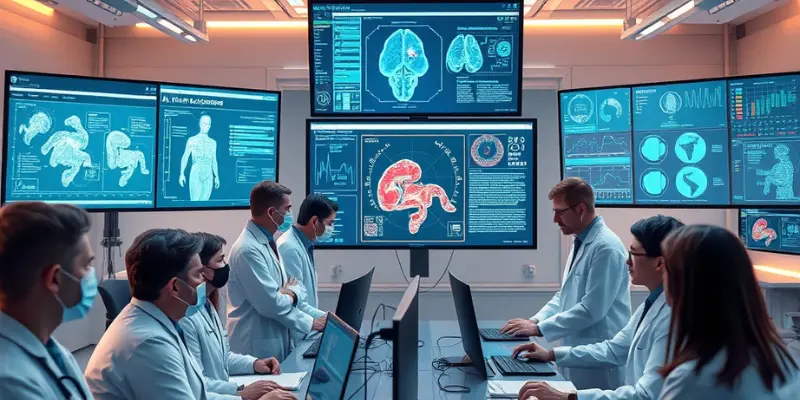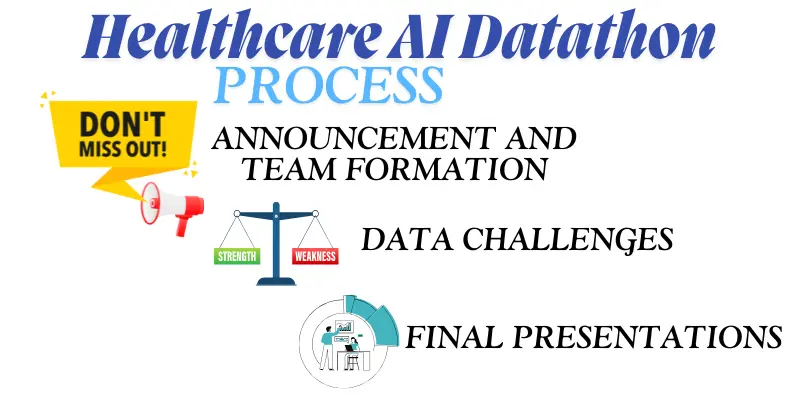What is Healthcare AI Datathon and How Does It Works
Published: 17 Feb 2025
Healthcare AI datathons are changing the way hospitals solve real-world problems. These events bring doctors, data scientists, and engineers together to find smarter ways to care for patients. In modern day these healthcare AI datathons are advancing patient care and medical research.
Originally popular in tech circles, datathons are now helping hospitals use real data to improve diagnoses, reduce errors and speed up research. Some studies show that these events can boost diagnostic accuracy by up to 20%, proving they’re more than just a trend. They’re a powerful tool in modern medicine.

What is Healthcare AI Datathon
A Healthcare AI Datathon is like a medical hackathon mixed with a science fair. Imagine doctors, data experts, and techies all in one big room. They don’t just talk but they team up, grab real hospital data, and race against time to build smart tools that solve real medical problems.
A Healthcare AI Datathon is a short, high-intensity event where teams work on real or simulated healthcare datasets to solve clinical challenges using artificial intelligence (AI) and machine learning (ML). These events promote innovation by bringing together healthcare professionals, data scientists, engineers, and students to develop AI powered solutions for diagnostics, treatment planning, or hospital operations.
The Rise of Healthcare AI Datathons
Healthcare is changing fast and data is at the heart of it. As hospitals and research centers collect more digital records, they need smart ways to make sense of it all. That’s where AI datathons come in.
These events first took off in the tech world. But now, they’re becoming popular in healthcare too. Why? Because they help us to turn raw data into real solutions.
Here’s what’s driving their rise:
- More healthcare data: Electronic health records, wearable devices, and imaging tools produce massive amounts of data every day.
- Growing interest in AI: Doctors and hospitals want to use machine learning to predict diseases, speed up diagnosis, and improve care.
- Team-based innovation: Datathons create a space where people from different fields—medicine, data science, and engineering—can solve problems together.
Real-World Momentum
Universities, clinics, and global health groups are now hosting healthcare AI datathons regularly. From Boston to Bangalore, teams are building AI models that tackle everything from sepsis prediction to medical imaging analysis.
The healthcare world is no longer asking “Should we use AI?” It’s asking “How fast can we build it?” And datathons are helping them do it.
How Healthcare AI Datathons Work
Healthcare AI Datathons are fast-paced events where people from different fields team up to solve real medical problems using data and artificial intelligence. Here’s how they typically work:

Announcement and Team Formation
The event begins with announcements shared through universities, social media, hospitals, and professional networks. These usually include the event’s goals, timeline, rules and the types of medical problems teams will work on.
How Teams Come Together:
- Promotion: Organizers use websites, emails and social media to reach a wide audience.
- Registration: Clear instructions help individuals, existing teams, or institutional groups sign up.
- Diverse Roles: Teams often include doctors, engineers, students, and AI experts.
- On-Site Teaming: Some events let participants form teams at the venue, encouraging collaboration.
- Preparation: Participants may get early access to datasets or problem briefs to study in advance.
Data Challenges
Participants in a datathon event receive real or simulated datasets, which may include:
- Electronic Health Records (EHRs): Identified patient information such as demographics, medical history, diagnoses, treatments and outcomes.
- Medical Imaging Data: Anonymized images like X-rays, MRIs or CT scans.
- Genomic Data: Sequencing information used to explore genetic factors in diseases.
- Sensor and Wearable Data: Information from devices monitoring vital signs or activity levels.
Suggested article to read: Problems with AI in healthcare.
These datasets are curated to make sure that the patient has privacy and compliance with ethical standards. Participants analyze the data to address specific challenges, such as:
- Predictive Modeling: Forecasting disease progression or patient outcomes.
- Diagnostic Tools: Developing algorithms to assist in identifying diseases from imaging or clinical data.
- Resource Optimization: Creating models to improve hospital operations, like patient flow or resource allocation.
- Personalized Medicine: Identifying factors that can influence individual responses to treatments.
Final Presentations
At the end of the datathon, each team presents its work to a panel of judges. Judges usually include clinicians, data experts, and industry leaders.
Teams explain:
- The medical problem they addressed
- How they used data and AI
- Their results and real-world impact
Projects are scored on creativity, practicality and how well they solve real health challenges. The best teams may win prizes or even get support to keep building their solutions.
Benefits of Healthcare AI Datathon
A Healthcare AI Datathon is a fast paced event where experts from various fields collaborate to develop AI solutions for real world medical challenges. These events bring doctors, data scientists, AI researchers and healthcare innovators to one place and force them to deal with healthcare issues using artificial intelligence.
Here are 10 key benefits of a Healthcare AI Datathon:
- Accelerates AI innovation – These AI Datathons encourage the rapid development of AI driven healthcare applications, such as improved diagnostics, predictive analytics and personalized treatment plans.
- Encourages collaboration – It invites together professionals from different fields to foster interdisciplinary teamwork between clinicians, engineers and AI specialists.
- Provides real world data – It provides access to anonymized patient data which helps participants develop and test AI models in a realistic healthcare setting.
- Enhances AI model development – Such events allow participants to refine their AI models through active experimentation with accuracy and reliability in medical applications, which has lead to invention of different ai agents.
- Promotes data driven decisions – Healthcare AI Datathons help healthcare professionals make informed clinical decisions based on AI powered insights.
- Raises ethical AI awareness – These educate participants on critical issues like data privacy, algorithmic bias and fairness to ensure responsible AI implementation in healthcare.
- Open funding opportunities – These events are a way to attract grants, investments and industry partnerships for further development.
- Develops AI skills – These datathons promote expertise in machine learning and data analytics with valuable skills for the future of healthcare AI.
- Speeds up AI adoption – With this progress in Healthcare AI Datathons hospitals and healthcare providers are beginning to fast track the implementation of AI solutions.
- Inspires future leaders – Events encourage young researchers, students, tech enthusiasts and AI professionals to pursue careers at the intersection of AI and healthcare.
Success Stories: Healthcare AI Datathons in Action
Healthcare AI datathons are not just theoretical exercises, they have already made tangible impacts in the medical field. By bringing together data scientists, healthcare professionals and AI experts, these events have led to some mind blowing advancements in the field of healthcare. Below are factual case studies that showcase the power of Healthcare AI datathons in transforming the field of healthcare.
1. Technion-Rambam Machine Learning in Healthcare Datathon
In March 2022, the Technion Israel Institute of Technology and Rambam Health Care Campus collaborated with MIT Critical Data to host a datathon in Haifa, Israel. This event brought together multidisciplinary teams to get grips on medical challenges using machine learning and AI.
Participants worked on diverse datasets particularly on improving patient care and clinical outcomes. The datathon fostered collaboration between engineers, data scientists and healthcare professionals which led to innovative solutions and highlighted the importance of interdisciplinary approaches in medical data analysis.
This case study was documented in a research paper published on arXiv. It covers detailed insights into the methodologies and outcomes of the event.
2. AI Cures Initiative of MIT Jameel Clinic
During the COVID-19 pandemic in 2020, the MIT Jameel Clinic launched the AI Cures initiative. It aims to apply AI techniques to discover effective therapeutics and develop medical devices for COVID-19.
This initiative involved collaborations with various organizations like Patrick J. McGovern Foundation and DARPA (Defense Advanced Research Projects Agency). Through these collaborative efforts, the initiative sought to accelerate the development of AI solutions in healthcare to address urgent healthcare challenges raised by the pandemic.
This initiative was widely covered by MIT News and has been recognized for its role in fostering AI innovation in healthcare.
3. ISTHMUS Platform for Real-Time Healthcare Machine Learning
The ISTHMUS platform was developed to address challenges in deploying machine learning models in healthcare settings. It offers a secure, scalable and friendly environment for operationalizing AI in healthcare.
One notable application involved predicting trauma survivability at hospital trauma centers. By integrating and harmonizing data from various sources, ISTHMUS enabled the creation of predictive models that provided timely and accurate diagnoses. It highly improved patient care and resource allocation.
The ISTHMUS project was featured in an arXiv research paper. It mainly shows contributions of ISTHMUS to the practical implementation of AI in hospitals.
Conclusion
Healthcare AI datathons are bringing change in the way medical challenges are presented by fostering innovation, collaboration, and problem solving abilities. These events provide a unique platform for professionals from diverse backgrounds to develop AI powered solutions that are opening new doors to diagnostics, optimize hospital operations and improve patient care. By leveraging these real world datasets and evolutionary AI techniques participants not only boost up their technical skills but also contribute to advancements that are ready to shape the future of healthcare AI.
Common Questions
The most Frequently asked questions about Healthcare AI Datathons are following:
A Healthcare AI Datathon is designed to bring together data scientists, healthcare professionals, and AI experts to collaboratively solve medical challenges using active healthcare data.
These events are open to a wide range of participants, including data analysts, AI engineers, healthcare professionals, researchers, and students.
Participants work with anonymized medical data sets such as Electronic Health Records, medical imaging data (X-rays, MRIs, CT scans), genomic sequencing data, and sensor data from wearable devices. These datasets are carefully curated to ensure patient privacy and compliance with ethical standards.
Most healthcare AI datathons are free to participate in, especially those hosted by universities or research institutions. Some may charge a small registration fee (usually $20-50) to cover food and materials. Corporate-sponsored events often provide free participation along with meals and prizes.
While programming skills in Python or R are helpful, they’re not always required. Many datathons welcome participants who contribute domain expertise, medical knowledge, or data analysis skills. Teams are designed to be diverse, so you can contribute your unique strengths while learning from others.
Most healthcare AI datathons run for 24-48 hours straight, similar to traditional hackathons. Some extend over a weekend (Friday evening to Sunday afternoon). A few longer formats may span a week, but the intensive collaboration period is usually 1-2 days.
Winning solutions often receive funding or support for further development into real healthcare applications. Many are published as research papers or shared as open-source projects. Some get adopted by hospitals or healthcare organizations, while others serve as proof-of-concept for larger research initiatives.
Many datathons now offer hybrid or fully remote participation options, especially after COVID-19. Remote participants can collaborate through video calls, shared coding platforms, and online project management tools. However, some events still prefer in-person collaboration for better team dynamics.
Absolutely! Healthcare AI datathons specifically seek diverse skill sets including software engineering, data visualization, user experience design, and business strategy. Your technical or analytical skills are valuable even without medical training. Medical professionals on your team can provide the clinical context you need.
Most datathons welcome participants from high school students to seasoned professionals. Some events are specifically designed for students, while others are open to all skill levels. The key is enthusiasm to learn and contribute, regardless of your formal education or experience level.





